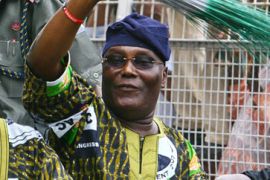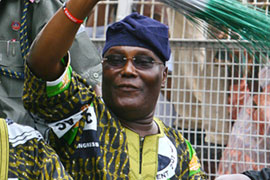Profile: Atiku Abubakar
Nigeria’s vice-president is a favourite to win the presidential elections.

 |
| Atiku Abubakar, Nigeria’s vice-president, is a leading presidential candidate [EPA] |
Atiku Abubakar, a Muslim from northern Nigeria, is currently the country’s vice-president and is believed to be the front-runner in the presidential elections due to take place on April 21.
A businessmen and a former customs officer, Abubakar’s vast wealth has led his opponents to accuse him of using his position in government to enrich himself and to channel government funds and foreign investment towards his own companies.
After declaring in 2006 that he would be contesting the presidential elections, the country’s electoral commission attempted to block him from running, arguing that he was ineligible to stand as he had been indicted to stand trial on corruption charges.
However, Abubakar challenged that decision in court and in April the supreme court of Nigeria overturned the commission’s decision and reaffirmed his right to run for president.
Career
Abubakar was born into relative poverty in north-eastern Nigeria. Orphaned at the age of eight, he studied medicine and then law before becoming a customs officer.
In 1999, he became Nigeria’s vice-president and oversaw the privatisation of dozens of state-owned firms.
His political opponents accused him of using this position to enrich himself. In 2005 he was investigated on suspicion of receiving hundreds of thousands of dollars from US firms in return for promoting their goods in Nigeria.
He has four wives, some of whom are Christian, which had led many members of Nigeria’s Christian minority to see him as the presidential candidate most likely to protect them from Islamist groups which are becoming increasingly popular in many parts of Muslim-majority Nigeria.
Political controversy
Abubakar’s campaign to become president has been the subject of intense controversy and media interest after the government attempted to prevent him from standing as a canidate for the country’s main opposition party.
In November 2006, he announced he would run for president and a month later was chosen as the presidential candidate for the Action Congress, the main opposition party.
Abubakar’s decision to run for president came soon after he helped to prevent Olusegun Obasanjo, the president, from changing the constitution in order to run for a third term.
This political manouevring caused a rift between him and Obasanjo, formerly his long-term ally, and sparked an attempt by the ruling Popular Democratic Party and its allies to prevent him from running.